
Occupy Central
Occupy Central is a civil disobedience movement which began in Hong Kong on September 28, 2014. It calls on thousands of protesters to block roads and paralyse Hong Kong's financial district if the Beijing and Hong Kong governments do not agree to implement universal suffrage for the chief executive election in 2017 and the Legislative Council elections in 2020 according to "international standards." The movement was initiated by Benny Tai Yiu-ting (戴耀廷), an associate professor of law at the University of Hong Kong, in January 2013.
OCCUPY CENTRAL - DAY 62: Full coverage of the day’s events
Beijing-loyal DAB admits ties to US group at the heart of 'external forces' debate over Occupy
PUBLISHED : Friday, 28 November, 2014, 6:05am
DAB lawmaker Gary Chan says it would be a problem if NDI trained others how to mobilise people.
Beijing loyalists have been eager to accuse leaders of the Occupy movement of allying with "external forces" - but one American group often linked to the protests has, in fact, been working with the city's leading pro-establishment party.
The US-based National Democratic Institute for International Affairs (NDI) confirmed that, over the past decade, members of Democratic Alliance for the Betterment and Progress of Hong Kong had joined its events.
"NDI has conducted numerous consultations and workshops for political parties in Hong Kong," it said. "Representatives from the DAB have participated."
The workshops, for candidates and party members, covered topics such as campaigning, media relations, public speaking and voter outreach.
NDI, which is often named when pro-Beijing politicians and media accuse foreign powers of pulling Occupy's strings, has had an office in the city for 17 years. It says it has no relations with the protests and its only activity in the past year has been funding a "neutral" website on democracy.
NDI is funded by the US Congress via the National Endowment for Democracy, which also provides funds to Hong Kong Human Rights Monitor and Solidarity Centre, a Washington-based body that gave grants to the pan-democratic Confederation of Trade Unions.
DAB lawmaker Gary Chan Hak-kan said NDI had held "one or two" seminars on "elections and theories" a few years ago.
"It's all right to talk about theories," said Chan. "But you do not know what they did with other parties. It would be a problem if they provided funding, trained others how to mobilise people and incited them to revolt."
Legislative Council president and DAB leading light Jasper Tsang Yok-sing directed the Post to other lawmakers when contacted about his party's relations with the NDI. He told Chinese-language media that there was collaboration with the NDI, including training and discussion of democratic development.
Tsang did reveal involvement by another US group, which suggested the slogan used by the party since 2005 to recruit candidates: "A party with a future".
"It came from a campaign expert of a group that helped women run for elections. We adopted it. But I don't remember the name. It was not NDI," he said.
Democratic Party member Lee Wing-tat said DAB members were at an NDI seminar he attended in the early 2000s.
Referring to rumours many DAB members were Communist Party members, he said: "If they say holding seminars is equal to interfering in Hong Kong affairs, did NDI support the Communists too? It is nonsense to make a conspiracy theory out of this kind of interaction."
This article appeared in the South China Morning Post print edition as DAB admits ties to US group at heart of 'external forces' gossip
Protests meant trouble in stores
PUBLISHED : Friday, 28 November, 2014, 6:05am
Traffic was moving freely along Nathan Road.
Owners of street-level shops in Mong Kok are pessimistic of a return to pre-Occupy business levels unless mainland tourists return en masse - though those based on upper floors said they saw no loss of trade until police moved in to end the two-month protest this week.
Traffic was moving freely along Nathan Road through the heart of the commercial hub yesterday after the pro-democracy protesters were removed. But among shopkeepers, many of whom have seen rents soar in recent years, passions continued to run high.
"If the officers would lend me a gun, I would have gone to Nathan Road and shot all those useless youths dead," said the owner of a leather shoe shop on Portland Street.
The 65-year-old, who has run his business in Mong Kok for 35 years, said the past two months had been the "worst ever". He had seen monthly revenue halved to about HK$150,000 and was forced to let two employees go last month.
Mainland visitors, the biggest buyers of his high-end products, were too scared to go to Mong Kok during the Occupy protests, he said.
Asked for his view on the protesters' cause, he added: "I don't care who the emperor is as long as there is rice in my bowl."
For the owner of a newsstand on Shanghai Street, the protests attracted the "wrong crowd" - ironic, given most of her profits came from selling books banned on the mainland to tourists.
"Everyone was attracted to the show on the street and no one was in the mood to spend," she said, adding that business fell by about a third in the first two weeks of the protest before bouncing back, at least until this week's street clearances. "Now I am only hoping they [mainland visitors] will come back soon."
But two upstairs bookstores, both of which devote much of their space to political gossip books beloved of mainland shoppers, saw little loss of trade except at the beginning and end of the protest.
"The customers we attract are more daring, after all they have to smuggle the books back," said a shopkeeper at one of them, on Sai Yeung Choi Street South. "Many mainland tourists know how to adjust and when it is safer to come and shop."
This article appeared in the South China Morning Post print edition as Protests meant trouble in stores
Police slammed over 'violence' in Mong Kok
Protesters complain of officers punching, kicking and smacking them on the head with batons during operation to clear Mong Kok
PUBLISHED : Friday, 28 November, 2014, 6:05am
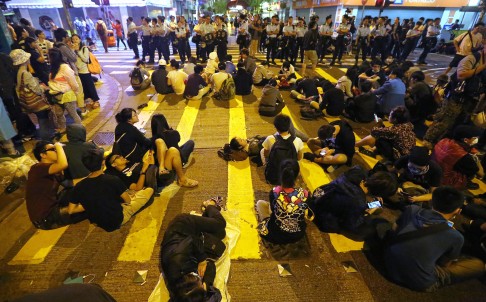
An officer caught on video hitting peaceful protesters with his baton will be removed from the current operation, police said last night after the force came under fire for abusing its power and using "disproportionate" force to disperse Occupy Central activists in Mong Kok.
Pro-democracy demonstrators yesterday recounted the police hostility they experienced during the two-day clearance operation at the occupied zone.
"Officers pinned me down, limiting my movement, causing wounds to my face and neck," said Joshua Wong Chi-fung, convenor of student group Scholarism, who was among the 169 people arrested. "They even attempted six or seven times to hurt my body, including my private parts."
Lester Shum, of the Federation of Students, said officers smacked his head with a baton, punched him and kicked him while trying to arrest him on Tuesday. His head was pushed against the ground, he added.
Shum's account was similar to that of the League of Social Democrats' Raphael Wong Ho-ming, who said police pinned him down and stepped on his head. People Power's Tam Tak-chi said his eye became bloodshot after an officer pushed his head to the ground.
A video by broadcaster DBC showed police dealing with people who appeared to be peacefully leaving the occupied zone. The video showed an officer using his baton to hit two people walking by on their back and waist, and another using a shield to push a man.
"Our anxieties and concerns go particularly to police who apparently exercised disproportionate powers and used disproportionate force on civilians," Civic Party leader Alan Leong Kah-kit said, while calling for protesters to exercise restraint.
Labour Party lawmaker Fernando Cheung Chiu-hung, who has made known that he has a mentally disabled daughter, said he was verbally abused by police while observing the situation in Mong Kok.
"I nodded to an officer, but he said, 'Don't you nod to me. Go home and take care of your daughter, she's sick," Cheung said. "I feel very sad. Some officers are filled with hatred."
The Professional Teachers' Union slammed Chief Executive Leung Chun-ying's administration for not compromising over Hong Kong's political reform, resulting in a breakdown of trust between police and the people.
In the small hours yesterday, hundreds of protesters repeatedly tried to re-occupy roads hours after traffic on Nathan Road returned to normal. Police and the crowd engaged in a fair bit of pushing and shoving.
One man was left with a bloodied head and several others were subdued and taken away. Police reinforcements were sent and red flags raised, warning people against charging.
A police spokesman said a minimum level of force was used after protesters failed to comply with multiple warnings, tried to block the roads, charged at police lines and incited others to provoke the officers.
He said the officer seen hitting people with his baton in the DBC video would be "removed from the current operation" and called for information to help the force investigate the matter.
Larry Kwok Lam-kwong, chairman of the Independent Police Complaints Council, declined to comment on whether the police had used excessive force, as it had yet to receive reports about the whole situation.
The IPCC said the police's in-house watchdog, the Complaints Against Police Office, had received 13 complaints regarding the Mong Kok clearance on Tuesday and Wednesday.
This article appeared in the South China Morning Post print edition as Police slammed over 'violence'
After Mong Kok clearance, students vow to target government buildings
In wake of the Mong Kok clearance, they say government buildings are now in their sights
PUBLISHED : Friday, 28 November, 2014, 6:05am
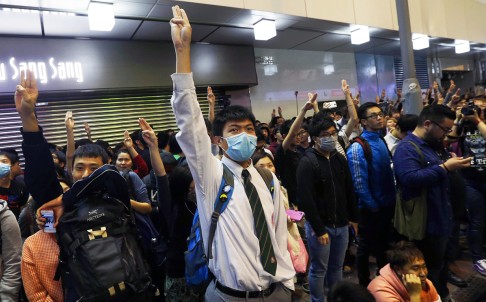
The Federation of Students has threatened to set its sights on government buildings in response to the police clearance of the Occupy camp in Mong Kok following violent overnight clashes.
 "The further actions include a possibility of some escalations pointed at government-related buildings or some government-related departments," federation core member Yvonne Leung Lai-kwok said yesterday.
"The further actions include a possibility of some escalations pointed at government-related buildings or some government-related departments," federation core member Yvonne Leung Lai-kwok said yesterday.
A possible target is said to be a footbridge leading to the government headquarters in Admiralty.
At a meeting on Wednesday, pan-democrats and Occupy founders had advocated ending the occupation.
A court hearing yesterday left a number of student leaders and activists unable to return to the cleared protest site in Kowloon, as the Occupy movement for universal suffrage entered Day 61.
Thirty-one defendants - including Scholarism's Joshua Wong Chi-fung, the student federation's Lester Shum and the League of Social Democrats' "Long Hair" Leung Kwok-hung and Raphael Wong Ho-ming - faced charges at Kowloon City Court, mostly obstructing bailiffs.
All disputed a condition, sought by the prosecution, that they be barred from re-entering an area in Mong Kok bound by Fa Yuen Street to the east, Dundas Street to the south, Shanghai Street to the west and Mong Kok Road to the north. They said it covered a wider area than specified in previous injunctions granted by the High Court.
Shum's lawyer Alvin Yeung said it was "disproportionate".
Leung, representing himself, said his freedom was reduced by five-fold as the new injunction area had increased by five times.
Principal Magistrate Peter Law Tak-chuen ruled all cases in the prosecution's favour.
A total of 169 people were arrested during the two-day Mong Kok operation this week, including a 29-year-old customs officer on sick leave, who was held for possessing weapons and unlawful assembly in Nathan Road at about 11pm on Wednesday.
A police source said his rucksack was found to contain a 20cm-long flick knife and a 30cm-long wooden knife together with a respirator and a helmet with a label declaring, "fighting for true universal suffrage".
Police were also probing 10 online messaging platforms includingHKGolden.com, WeChat and Line that were used to mobilise people to reoccupy the Mong Kok protest zone, according to another source.
Last night, more than 100 people gathered in Sai Yeung Choi Street South. An Apple Daily video photographer was pushed to the ground, handcuffed, and arrested. He was the second journalist arrested in the Mong Kok operation, with a Now TV engineer who was held for assaulting police released yesterday.
Chief Executive Leung Chun-ying said if people stopped occupying the streets, "we won't need to consider using an injunction" and police to restore order.
Chris Lau, Joyce Ng, Clifford Lo, Samuel Chan, Danny Mok, Peter So
This article appeared in the South China Morning Post print edition as Students vow to escalate protests
Follow Deng's footsteps: let some have democracy first
Bill Xiang Yang calls on current leaders to adapt his approach to wealth
PUBLISHED : Friday, 28 November, 2014, 12:40pm
For now, the central government arguably has no appetite for turmoil in Hong Kong. Photo: Bloomberg
The Hong Kong pro-democracy protests are now entering their third month, against a background of the police clearing demonstration sites and arresting student protesters. That's not a good sign.
Hong Kong's many local businesses have already been struggling with a sluggish economy. Recently, the government set its forecast for annual growth at 2.2 per cent, against a global average of 3.3 per cent. If the rallies are protracted, or more violent clashes break out, the impact will extend to the wider economy, not just the catering, retail and transport trades, hitting investor confidence and even employment.
When students block roads, occupy streets and disrupt the livelihood of other residents, they probably don't take those very real matters into account. Beijing has been betting that Hong Kong's silent majority, who have to make money for daily life, won't be willing to accept the heavy price, eventually. Independent polls now show people overwhelmingly oppose continued occupation. It sounds as if Beijing may well be on the winning side.
The protests, however, pose a huge political challenge for the Chinese leadership, at a time when it is dealing with a daunting array of problems on the mainland: it is trying to ensure a tepid economy - by Chinese standards - does not fall below the government's 7 per cent floor for growth while fighting terrorism in Xinjiang and driving an anti-corruption campaign that has rattled powerful vested interests.
Any big misstep could provide ammunition for the party's diehard conservatives who are unhappy about the corruption crackdown and other reform policies. Although President Xi Jinping's corruption fight is immensely popular with ordinary Chinese, it's hard to say how successful it will be in the long run, due to a lack of checks and balances.
For now, the central government arguably has no appetite for turmoil in Hong Kong. Xi may well be keeping a close eye on the situation, and a variety of proposals are under discussion behind closed doors. Full of anxiety, the leadership also wishes to find a face-saving solution to end the unrest, in case it sets off a chain reaction.
The trouble has been largely of Beijing's own making. In the early 1980s, Deng Xiaoping formulated the "one country, two systems" principle for the transfer of sovereignty. In accordance with that, the Basic Law accords the former British colony a high degree of autonomy and promises universal suffrage as an eventual goal, a deal that China's leaders hoped would one day be extended to Taiwan.
Yet, after witnessing what has happened in Hong Kong, Taiwanese are justified in worrying about suffering the same problems in the event of reunification. As everyone knows, today's Hong Kong is tomorrow's Taiwan. So the dream of achieving a peaceful reunification seems out of reach.
For Hong Kong, it needs to return to normal for the sake of its economy. Democracy is, after all, a gradual process. Of course, it's hard for the student protesters to walk away empty-handed. There are still feasible choices for both sides to break the deadlock - such as negotiating a truly representative nominating committee - even though none is perfect. Mutual concessions are vital.
Over 30 years ago, as Deng was pushing for reform and opening up in an impoverished China, he famously proposed letting some people get rich first. As a result, the economy got off to a good start and China is now the world's second-largest economy through hard work. And Deng is acclaimed as one of China's greatest leaders.
So why can't Xi try the same approach and let some people have democracy first? That would also be a good start.
Bill Xiang Yang is an independent investor living in China
This article appeared in the South China Morning Post print edition as Follow Deng's footsteps: let some have democracy first
PUBLISHED : Friday, 28 November, 2014, 12:49pm
UPDATED : Friday, 28 November, 2014, 12:49pm
Occupiers are losing the high ground
Michael Chugani says the conduct of some Occupy protesters in Mong Kok is a good indication of why support for the movement is waning
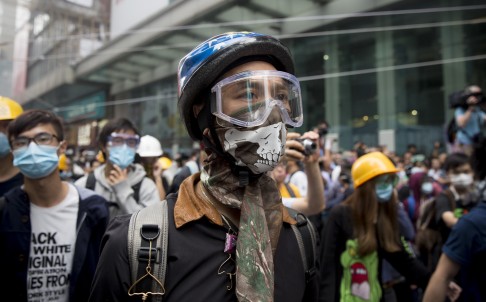
Isn't Chief Executive Leung Chun-ying supposed to be the loathed lapdog who deliberately misrepresented Hong Kong's democratic aspirations to his Beijing bosses? So how come his popularity has suddenly climbed when political strife continues to tear Hong Kong apart? Even his administration's popularity has rebounded. There's a message there somewhere.
Can it be that people are starting to like Leung? Or is it that they are getting sick of Hong Kong being held hostage in the name of democracy? Either way, it spells trouble for the umbrella movement. It's losing the moral high ground it captured at the start. The movement's message has since become so garbled it is on course to snatch defeat from the jaws of victory.
Polls by two universities show Leung's approval rating rising, by 4.3 points and 4.1 points, to 44.7 and 42.7 respectively out of 100 points. A slew of other recent polls showed more than 70 per cent of people now want the occupation protest to end.
Why are Hongkongers suddenly turning against a democracy movement that, just two months ago, captured the world's imagination? The simple answer is that they're starting to see things more clearly as they become less blinded by fury over the police tear-gassing of protesters. If we dare to be honest with ourselves, this was never a totally peaceful movement, although no one wanted to say so. Those who did were derided as anti-democrats.
Forget about the movement's radicals who rammed the Legislative Council's doors; anyone who watched with honest eyes this week's clearance of the Mong Kok occupy site would agree not all protesters peacefully complied with the court injunction. On both Tuesday and Wednesday, some provoked the police, others confrontationally quibbled over the exact boundaries of the court injunction, and radical protesters returned at night to clash with police.
When police used pepper spray and batons to disperse the agitators, they were accused of violence against peaceful protesters. The movement is losing support because people are now seeing it for what it has evolved into - a leaderless and disorganised movement that has squandered its moral authority, hurt the livelihoods of ordinary people and made a mockery of our rule of law.
Didn't the original script call for peaceful occupation without resisting arrest? So why did the Mong Kok protesters don goggles and hard hats instead of respecting the court injunction by voluntarily leaving or letting the police arrest them without resisting? It is pointless now for recriminations as to who turned violent first - the students who scaled the security fence of government headquarters, which then drew thousands to the streets demanding their release, or the police, who fired tear gas at surging crowds.
But it is disingenuous for the pan-democrats to say Leung has turned the police force into a political tool. The movement wants a political solution. Political solutions are only possible when there is give and take, not when one side insists its demands must be met. The movement is losing public support because it is losing the moral argument.
Michael Chugani is a columnist and TV show host.mickchug@gmail.com
This article appeared in the South China Morning Post print edition as Losing the plot
Joshua Wong: Students won’t try to retake Mong Kok after police show of strength

Students will not attempt to retake Mong Kok, Scholarism convenor Joshua Wong Chi-fung said, as such a plan is not likely to succeed under a heavy police presence.
Department of Justice granted more time to consider Mong Kok criminal contempt cases

The High Court on Friday approved the Department of Justice’s application for more time to consider whether to proceed with cases against 23 people arrested for criminal contempt during the clearance of Mong Kok roads on Tuesday.
Police step up presence in Mong Kok after two nights of clashes

Police took to the streets of Mong Kok on Friday night to stage a show of force in a bid to prevent crowds of protesters from re-occupying roads as night fell.
Pussy Riot voice support for Occupiers
PUBLISHED : Saturday, 28 November, 2014, 1:44am
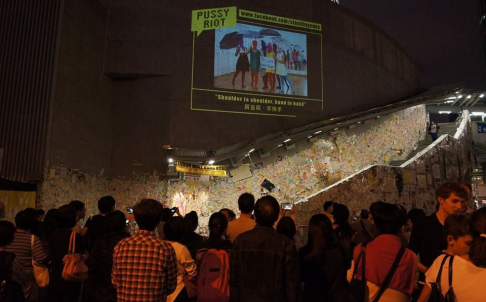
Russian feminist punk rock protest group Pussy Riot made a surprise appearance at the Admiralty occupy site tonight via a projected image.
The group, known for its open opposition to Russian president Vladimir Putin, told Occupiers to "add oil" in an image sent via Stand By You: Add Oil Machine for Hong Kong Occupiers, which projects messages sent from all over the world onto the wall of government headquarters.
The image had six masked members of Pussy Riot holding umbrellas and a sign that says Occupy Hong Kong, along a message "Shoulder to shoulder, hand in hand."
Artist Sampson Wong, creator of the machine, said this was an upgraded version of the Add Oil Machine. He said the project has collaborated with The Voice Project and Human Rights in China to seek support from international celebrities to create a "2.0 version" in light of the two-month anniversary of the Occupy protests.
Other celebrities who will appear include Peter Gabriel, Iron & Wine, Samantha Mathis and Mario Batali. Wong said Hong Kong celebrities would also make an appearance over the weekend.
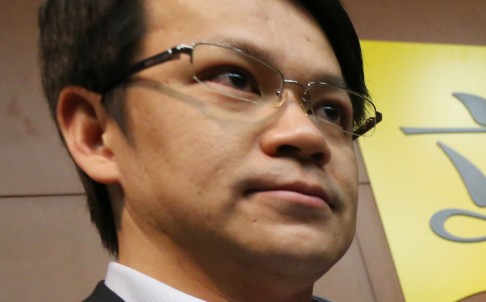
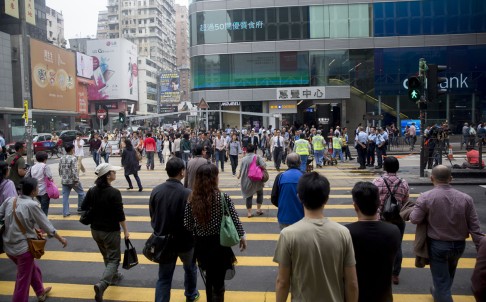
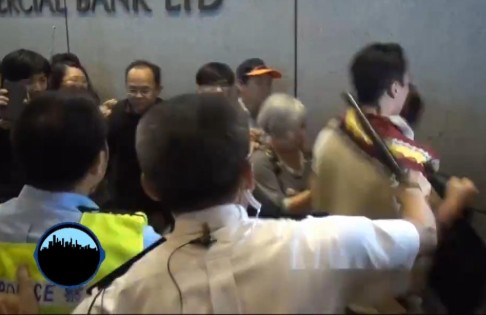
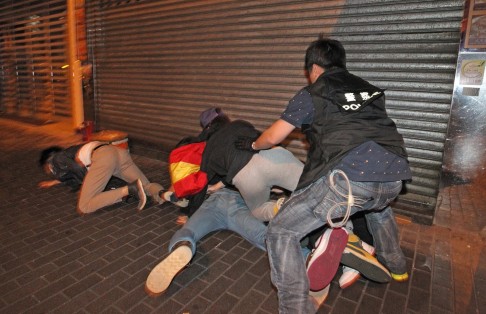
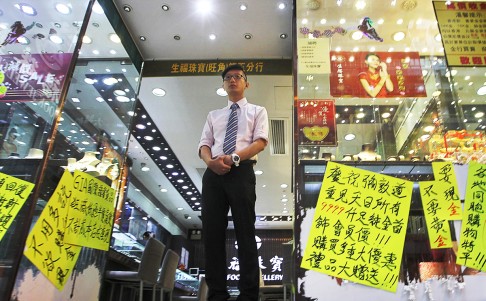
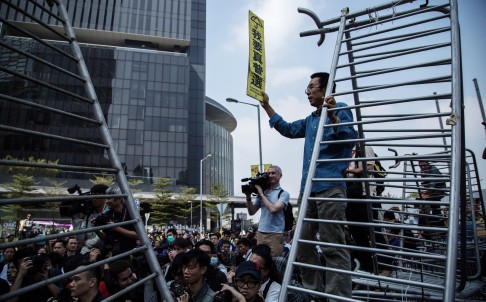


沒有留言:
張貼留言